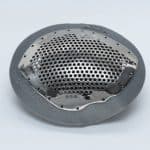
Kerim Genc serves as a Product Manager for the Simpleware Group at Synopsys, bringing over a decade of expertise to the role. Joining Simpleware in 2011 to oversee regional sales, he seamlessly navigated through progressively influential positions, including global sales and business development, culminating in his current role as a Product Manager. A highly qualified professional, Kerim earned his BS and MS in biomechanics from the University of Calgary and the Pennsylvania State University, respectively. He further solidified his academic credentials with a Ph.D. in Biomedical Engineering from Case Western Reserve University, where he utilized computational methods to investigate innovative countermeasures addressing spaceflight-induced bone loss and fracture risk. Kerim will be speaking and attending our in-person/hybrid event focusing on 3D technologies and orthopedics on Feb 12th, 2024 in San Francisco, California, USA.
When was the first encounter you had with 3D printing?
Kerim: Although I have been working in the 3D image-based modeling space for 15+ years including graduate school, I must admit that my first real connection to the impact of 3D Printing was pretty recent when watching the “Roy’s Story” video from our collaborators at the Advanced Projects Laboratory at Nicklaus Children’s Hospital. I was presenting the work at a seminar, and I found myself getting choked up talking about the case and needing to pause my talk. It was only for a brief moment, and I don’t think anyone really noticed, but I was surprised that it hit me the way it did. I think it is because I have children now and just putting myself in the place of these parents that trust the doctors with their kids’ lives put a whole new perspective on the importance of this work.

What inspired you to start your journey?
Kerim: My Ph.D. supervisor Dr. Peter Cavanagh was the main inspiration that sent me on my journey down the road of 3D image-based modeling. I remember him telling me that a Ph.D. is a chance to fill your toolbox with as many tools as possible, and if you do it with intention, you can confidently head in any direction.

Who inspired you the most along this journey in 3D printing?
Kerim: Dr. Johann Henckel at the Royal National Orthopaedics Hospital in London has been inspiring me to continue along this path. He is a collaborator, colleague, and friend whom I admire and respect. His consistent drive to push and pull research and industry toward a singular goal of improved clinical outcomes is inspiring.

What motivates you the most for your work?
Kerim: Working with a great team and driving an impactful product forward.
What is/are the biggest obstacle(s) in your line of work? If you have conquered them, what were your solutions?
As a Product Manager, I have a lot of ideas bouncing around in my head, but it is always a challenge to distill them down to a compelling story that resonates. Whether for an invited talk, internal meeting or blog post, improving your story is a never-ending challenge.

What do you think is (are) the biggest challenge(s) in 3D Printing/bio-printing? What do you think the potential solution(s) is (are)?
Kerim: The biggest challenge I see is getting value from the image-based 3D Printing workflow without being at the point of the scale. We have customers in the Medical Device space that are at scale and use our Machine Learning based AI tools to fully automate their image-based workflow, process up to 100 cases/day and maximize their value. However, 3D Printing at the point of care is still in its infancy and many workflows are not repetitive, so they tend to be more manual, meaning they are more difficult and expensive. As the field matures and different groups find their niche, I think we will see them come to the point where they can leverage Machine Learning based AI techniques to automate and streamline their workflows.
If you are granted three wishes by a higher being, what would they be?
Kerim: Spending even more time with my family x 3, is never enough.
What advice would you give to a smart driven college student in the “real world”? What bad advice you heard should they ignore?
Kerim: Take on as much as you can that comes across your path, even if you don’t see an immediate benefit, it will come. Bad advice is to follow your passion… if you have a passion, don’t turn it into a job. Instead, find something you like and are really good at, and then put your head down and pursue it with all your energy.
Related Articles:
Artificial Intelligence and 3D Printing (Expert Corner)
Artificial Intelligence in Healthcare 3D Printing (On Demand Video, 2021)
When Artificial Intelligence Meets 3D Printing (Expert Corner)
Streamlining Orthopedic Surgical Planning with AI (Expert Corner)




 Jan 20, 2024
Jan 20, 2024 






Comments